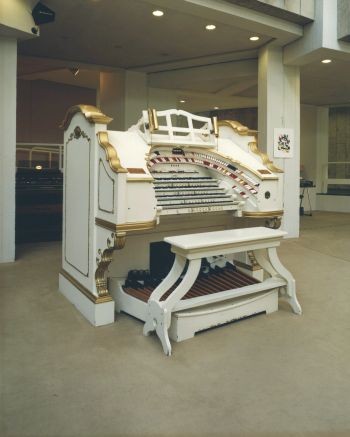Annette Kelm
08 Sep - 13 Oct 2007
Annette Kelm
Four Seasons
8 September - 13 October 2007
‘Four Seasons’ is Annette Kelm’s first solo show at Johann König, Berlin.
This recent series of photographs shows arrangements of objects, from unusual musical instruments to patterned textiles and an eccentric-looking bag. In inviting us to contemplate the objects depicted and the various possibilities of presenting and arranging them, the pictures quietly lead us to reflect on fine art photography as a whole and its origins in the classical visual media.
Objects and genres frequently switch roles in Annette Kelm’s work. A trash-design, 80s-style watch case is presented with the slick panache of an advertising shot, but still has an echo of the baroque memento mori. In a clear continuation of the traditional still life with a musical instrument, we see the first electric guitar in history against a backdrop of cheap cloth produced in Holland for sub-Saharan markets. The large-format photographs of textile patterns, of green leaves or exotic abstractions, on the other hand, are examples of archived and near-forgotten luxury material designs in the style of Dorothy Draper, the designer whose blend of neo-baroque, surrealism and modernism has been a driving force in US interior design since the 1920s.
This kind of information on the cultural and historic relevance of the photographed objects is not easily fathomed from the photographs themselves: Annette Kelm prefers to give her pictures poetic titles like “Stars Look Back,” and the surprising combinations of objects within a single work thwart simple interpretations and categorizations. For instance, the controlling device of the Wurlitzer organ, the “sound-machine” of early silent cinema, is seamed by a Miró print, a combination that might even be read as a comment on bourgeois tastes in interior design. Which object is presented in what way, and for what purpose? What combinations of objects are imaginable or have so far not been imagined? The cowboy with a fan in his hand and the mustachioed woman peering out of a slanted Renaissance house seem somehow familiar. As Vanessa Joan Müller has indicated in an essay, the real meaning of these photographs would appear to lie precisely in this interplay of differences and repetitions.
Born in 1975, Annette Kelm studied art in Hamburg before moving to Berlin, where she now lives and works. This September, she will take part in the Lyon Biennale of Contemporary Art. A solo exhibition at the Wattis Institute in San Francisco is planned for 2008. Samples of her work are currently on show at the Pump House Gallery in London and the Shedhalle in Zurich. The catalogue Errors in English, with texts by Sabeth Buchmann, Jessica Morgan and Michaela Meise, was published in 2006.
Four Seasons
8 September - 13 October 2007
‘Four Seasons’ is Annette Kelm’s first solo show at Johann König, Berlin.
This recent series of photographs shows arrangements of objects, from unusual musical instruments to patterned textiles and an eccentric-looking bag. In inviting us to contemplate the objects depicted and the various possibilities of presenting and arranging them, the pictures quietly lead us to reflect on fine art photography as a whole and its origins in the classical visual media.
Objects and genres frequently switch roles in Annette Kelm’s work. A trash-design, 80s-style watch case is presented with the slick panache of an advertising shot, but still has an echo of the baroque memento mori. In a clear continuation of the traditional still life with a musical instrument, we see the first electric guitar in history against a backdrop of cheap cloth produced in Holland for sub-Saharan markets. The large-format photographs of textile patterns, of green leaves or exotic abstractions, on the other hand, are examples of archived and near-forgotten luxury material designs in the style of Dorothy Draper, the designer whose blend of neo-baroque, surrealism and modernism has been a driving force in US interior design since the 1920s.
This kind of information on the cultural and historic relevance of the photographed objects is not easily fathomed from the photographs themselves: Annette Kelm prefers to give her pictures poetic titles like “Stars Look Back,” and the surprising combinations of objects within a single work thwart simple interpretations and categorizations. For instance, the controlling device of the Wurlitzer organ, the “sound-machine” of early silent cinema, is seamed by a Miró print, a combination that might even be read as a comment on bourgeois tastes in interior design. Which object is presented in what way, and for what purpose? What combinations of objects are imaginable or have so far not been imagined? The cowboy with a fan in his hand and the mustachioed woman peering out of a slanted Renaissance house seem somehow familiar. As Vanessa Joan Müller has indicated in an essay, the real meaning of these photographs would appear to lie precisely in this interplay of differences and repetitions.
Born in 1975, Annette Kelm studied art in Hamburg before moving to Berlin, where she now lives and works. This September, she will take part in the Lyon Biennale of Contemporary Art. A solo exhibition at the Wattis Institute in San Francisco is planned for 2008. Samples of her work are currently on show at the Pump House Gallery in London and the Shedhalle in Zurich. The catalogue Errors in English, with texts by Sabeth Buchmann, Jessica Morgan and Michaela Meise, was published in 2006.

